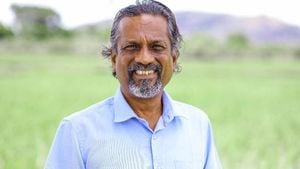Last weekend, the picturesque city of Nice played host to the inaugural edition of the World Artificial Intelligence Film Festival (WAIFF), an event that has sparked considerable interest in the intersection of technology and cinema. Organized by the Alpes-Maritimes Department, the festival attracted a large audience eager to explore short films created with the assistance of artificial intelligence. A remarkable achievement, over one thousand films from fifty-three countries were submitted for this first edition, showcasing the global enthusiasm for AI in the arts.
Among the prominent figures at the festival was actress, director, and producer Julie Gayet, who took her role as a jury member very seriously. She was joined by fellow jurors Thomas Bidegain and Alexia Laroche-Joubert. In an exclusive interview conducted on the terrace of the Hotel Aston, Gayet shared her insights and motivations for participating in this groundbreaking event.
"It’s really very pioneering, very new; it didn’t exist until now," Gayet remarked, emphasizing the evolving nature of cinema and its relationship with new technologies. She noted, "Cinema has always undergone revolutions over the years!" For her, the ethical implications and copyright issues surrounding AI in film were particularly compelling. "How can we have AI with ethical and responsible values? What could we achieve?" she pondered. Gayet highlighted France’s progressive stance on cultural exceptions, advocating for laws that protect creators and the cinematic arts.
When asked about the perception of AI in the film industry, Gayet expressed a hopeful view. "Rather than being in fear, it’s better to try to understand and engage with it if we want to see what we can do with it," she stated. Her curiosity drives her attendance at festivals, where she enjoys discovering new perspectives and films. "New technologies also allow us to have a new view of the world, which is different," she added.
As a jury member, Gayet is particularly sensitive to the representation of women in AI and film. "I find it important to show that there are women interested in these subjects. Women of all ages can have a different perspective on how to manage and engage with AI," she emphasized. She noted the ongoing conversation about perfectionism in the industry, stating, "I don’t believe in perfection! I think ‘Nobody’s perfect’—that’s what Billy Wilder’s film Some Like It Hot summarizes!" Gayet believes that human imperfections are vital and should not be sanitized or filtered out in film.
Reflecting on the use of AI in film, Gayet mentioned the recent Oscar-winning performance of Adrien Brody in The Brutalist, where AI was utilized to modify his accent. "Here, AI was a wonderful tool. Why not use tools to help us?" she said, acknowledging the advantages AI can bring in enhancing performances. "Even if we take courses for months, AI can ensure the accent is perfect. It’s just a sound correction to make the accent right. It doesn’t hinder the acting," she explained.
With the Cannes Film Festival approaching, Gayet sees the need for discussions about AI in such significant events. "There were debates last year initiated by TechCannes. Debates are necessary," she insisted. She pointed out that the discourse around AI encompasses not only ethical questions but also issues of wages and job displacement. "Young people are inundated with images on social media, some of which are manipulated. That’s why I believe education about images in schools is urgent," she stated. Gayet also emphasized the importance of cultural initiatives, like the pass culture, which aims to provide students with opportunities to experience cinema.
In addition to her jury duties, Gayet recently directed a film titled Olympe, une femme dans la Révolution, which aired on France 2 last month. Looking ahead, she shared her plans to co-direct a film with Mathieu Busson about the historical figure Louise Michel. "We know little about this woman. She was part of those golden statues that emerged from the Seine during the opening ceremony of the Olympics. I think all French people should know her story. It’s important to bring such women to the forefront!" she concluded.
The WAIFF not only celebrates the artistic possibilities of AI but also catalyzes important conversations about its ethical implications and the role of women in technology and film. As the festival continues to grow, it promises to be a vital platform for exploring how AI can coexist with human creativity, ensuring that the future of cinema remains diverse, inclusive, and innovative.





